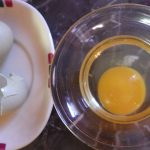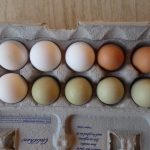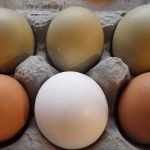 Earlier this year I posted an Egghead Quiz. We love to hear from readers about our posts and this one got lots of responses. One reader indicated she wished I had also addressed eating egg whites vs the whole egg. This got me thinking and doing some additional research in this area.
Earlier this year I posted an Egghead Quiz. We love to hear from readers about our posts and this one got lots of responses. One reader indicated she wished I had also addressed eating egg whites vs the whole egg. This got me thinking and doing some additional research in this area.
Like many of you, I’ve been teaching healthful living and nutrition-related topics for many years and the “bad guys” seem to come and go. This is based on current research and longitudinal studies. As I tell my students, as we learn more, we know more and things change.
Eggs (and specifically the yolks) used to be one of the “bad guys”. What we were talking about here was cholesterol and the belief that eating eggs and other foods containing dietary cholesterol increased the risk of heart attack and cardiovascular disease. Early versions of the Dietary Guidelines for Americans (DGA) recommended that cholesterol intake be limited to no more than 300 mg per day. This is no longer believed! 
The 2015 DGA do not contain this recommendation because research does not show a relationship between dietary cholesterol and serum cholesterol. Cholesterol is no longer considered a nutrient of concern for overconsumption. The American Heart Association recommendations agree with this.
The 2015 Dietary Guidelines for Americans encourage the consumption of healthy dietary patterns that contains all foods and beverages at an appropriate calorie level while limiting saturated fats, added sugars and sodium.
Saying that, where do eggs fit in?
They can be part of a well-balanced healthful diet.  According to the USDA Nutrient Data Base one large (50 grams) hard-cooked egg contains 78 calories, 6 grams protein and 5 grams of fat (1.6 g is saturated, 2 g monounsaturated and .7 polyunsaturated) and varying amounts of 13 essential vitamins and minerals. While egg whites contain almost half of the egg’s protein along with riboflavin and selenium, the majority of the nutrients are found in the yolk. If you break it down, the yolk contains all of the egg’s fat and 76% (59) of the calories, 42% (2.52 g) of the protein and all of vitamins A, D, and B6, zinc, iron and choline. Egg yolks are one of the only foods that naturally contain vitamin D.
According to the USDA Nutrient Data Base one large (50 grams) hard-cooked egg contains 78 calories, 6 grams protein and 5 grams of fat (1.6 g is saturated, 2 g monounsaturated and .7 polyunsaturated) and varying amounts of 13 essential vitamins and minerals. While egg whites contain almost half of the egg’s protein along with riboflavin and selenium, the majority of the nutrients are found in the yolk. If you break it down, the yolk contains all of the egg’s fat and 76% (59) of the calories, 42% (2.52 g) of the protein and all of vitamins A, D, and B6, zinc, iron and choline. Egg yolks are one of the only foods that naturally contain vitamin D.
The biggest concern about eggs would be about in the area of saturated fats. Animal products, including eggs, do contain saturated fat, which can raise blood cholesterol. Too much bad (LDL) cholesterol in the blood can contribute to formation of plaque and narrowing of the arteries. The DGA recommendation is that less than 10% of your total daily calories come from saturated fats. For someone eating 2000 calories a day that’s about 13 grams of saturated fats.
While the numbers are small, if you are concerned about saturated fats and calories you could choose to eat one whole egg plus two egg whites instead of two whole eggs. But, don’t skip the yolk altogether, it contains a lot of the “good guys”.
A calorie comparison shows that portion control is important so you eat a 2 egg equivalent instead of 4:
- 4 egg whites (2 egg equivalent) = 68
- 1 egg plus 2 egg whites (2 egg equivalent) = 112
- 2 eggs = 156
- 4 eggs = 312
Cost comparison shows real eggs are cheaper by 50%:
- Egg substitute (nonfat) = .16 ounce or about .32 for one egg equivalent
- Eggs .16 each average cost (averaging store brand and free range eggs at $2 per dozen)
The real issue with eggs may be the high-saturated-at additions often added to eggs and omelettes:
- Cheese – just one ounce is 110 calories, 20 grams of fat and 6 grams of saturated fat
- Butter – just one tablespoon is 111 calories, 11 grams of fat, and 7 grams of saturated fat
- Whoa – this means a 4 egg omelette cooked in a tablespoon of butter with one ounce of cheese would rake in 533 calories and over 30 grams of fat.
Solution:
Go with a 2 egg equivalent and prepare them scrambled with a little cooking oil spray in a nonstick skillet or poached or hardboiled. Skip the butter and cheese.

Cheryle Jones Syracuse, MS
Professor Emeritus, The Ohio State University
References:
https://health.gov/dietaryguidelines/2015-scientific-report/pdfs/scientific-report-of-the-2015-dietary-guidelines-advisory-committee.pdf Part D, Chapter #1, page 1
https://www.incredibleegg.org/egg-nutrition/cracking-the-cholesterol-myth/
http://circ.ahajournals.org/content/early/2013/11/11/01.cir.0000437740.48606.d1 2013 American College of Cardiology and the American Heart Association Guidelines on Lifestyle Management to Reduce Cardiovascular Risk
https://ndb.nal.usda.gov/ndb/ USDA Food Composition Databases
http://peapod.com for cost comparisons
Want heart healthy teaching tools? You are in luck:
New Products Available Now
Check out the Nutrition Nuggets page which features over 20% off three special products each week.
Connect with us on Google Plus















